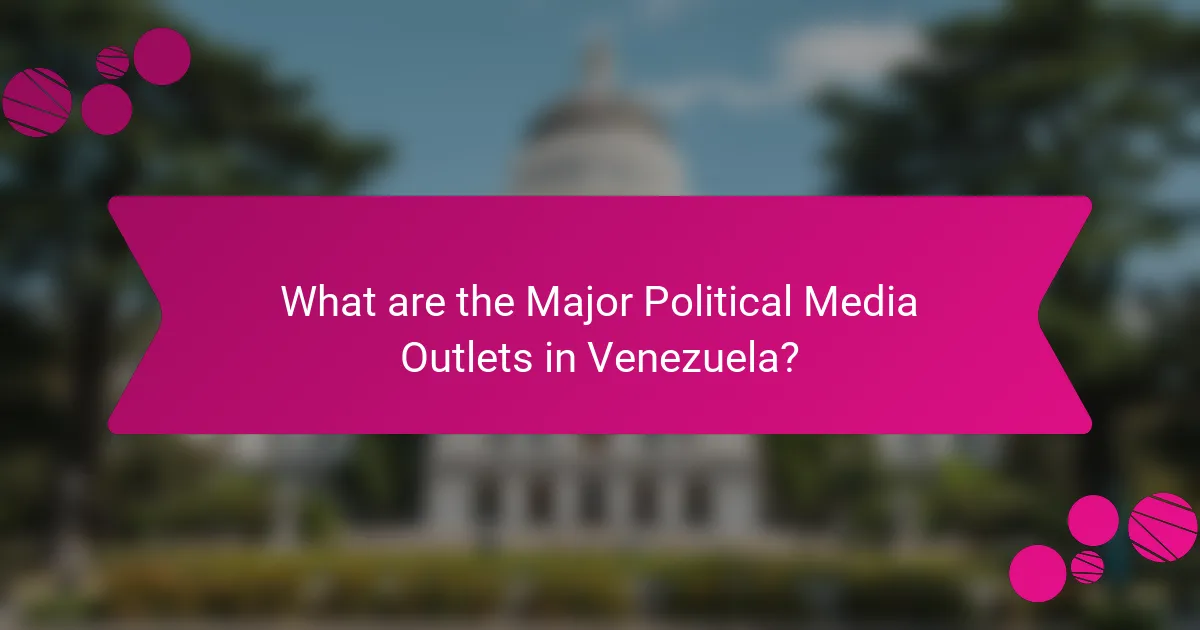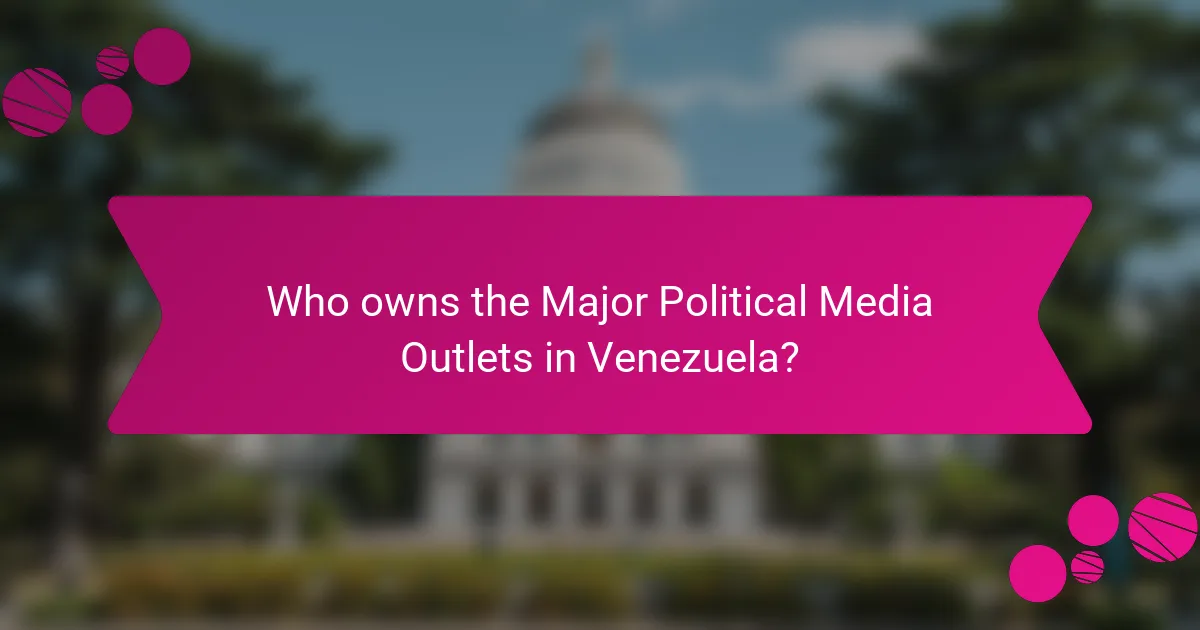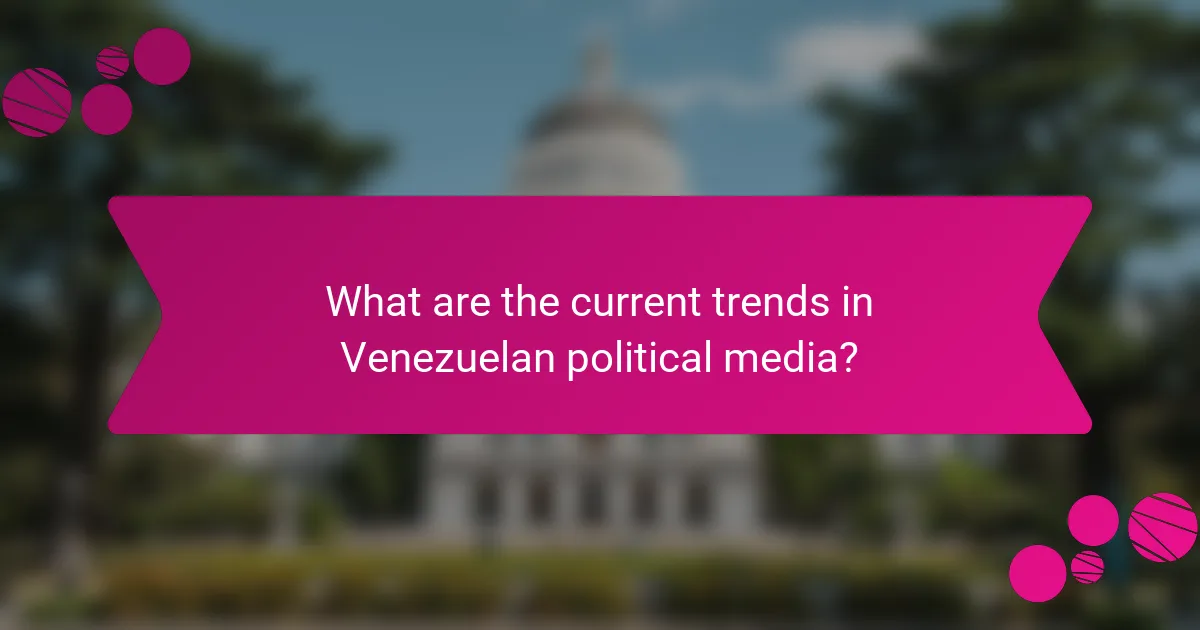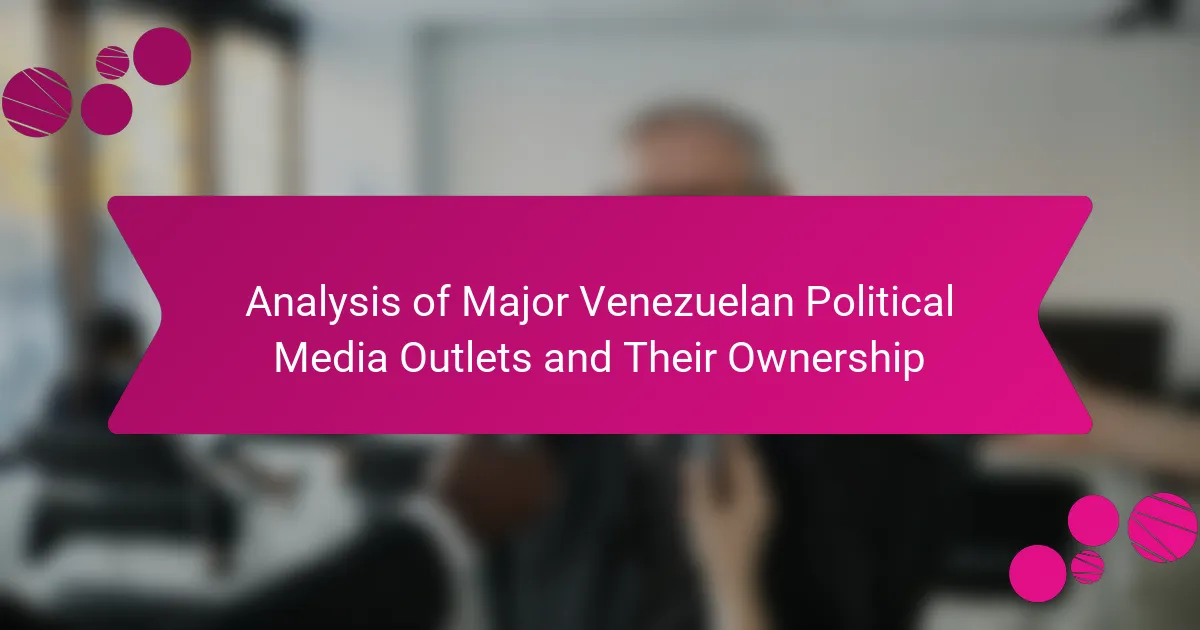
What are the Major Political Media Outlets in Venezuela?
The major political media outlets in Venezuela include Globovisión, El Nacional, and Últimas Noticias. Globovisión is known for its critical stance against the government. El Nacional is a prominent newspaper that has faced government pressures. Últimas Noticias is widely circulated and has a more neutral tone. These outlets play significant roles in shaping public opinion. Their ownership often influences their editorial policies. Globovisión is owned by a private group, while El Nacional has a long history of independent journalism. Últimas Noticias is owned by the state. These ownership structures impact their reporting and audience reach.
How do these outlets influence public opinion in Venezuela?
Media outlets in Venezuela influence public opinion by shaping narratives and framing political discourse. They provide information that aligns with specific political agendas. For instance, state-controlled media often promote government policies while discrediting opposition views. In contrast, independent media may highlight government failures and advocate for change.
Public trust in these outlets varies significantly based on ownership and perceived bias. According to a 2021 survey by the Venezuelan Institute of Data Analysis, 70% of respondents view state media as unreliable. This distrust leads many to seek information from alternative sources, further polarizing public opinion.
The government’s control over media access and distribution enhances its influence. By limiting the reach of dissenting voices, the state can effectively manage public perception. Additionally, social media platforms serve as alternative channels for information, allowing citizens to share and consume content outside traditional media constraints.
In summary, Venezuelan media outlets impact public opinion through narrative control, trust dynamics, and access to information.
What role do political affiliations play in shaping media narratives?
Political affiliations significantly influence media narratives. Media outlets often align with specific political ideologies. This alignment shapes the framing of news stories and the selection of topics. For example, outlets may emphasize issues that resonate with their political base. They may downplay or ignore perspectives that contradict their stance. In Venezuela, state-controlled media predominantly promote government narratives. In contrast, independent media often critique government policies. Studies show that audiences perceive news through the lens of their political beliefs. This creates echo chambers that reinforce existing views. Overall, political affiliations determine how media narratives are constructed and presented.
How do these outlets address issues of censorship and freedom of speech?
Major Venezuelan political media outlets address issues of censorship and freedom of speech by highlighting government restrictions and advocating for press freedom. These outlets often report on instances of censorship imposed by the Venezuelan government, including the closure of independent media and the intimidation of journalists. For example, in 2017, the government blocked access to several news websites that reported critically on its actions. Additionally, these media organizations frequently publish articles that call for the protection of journalists and the right to free expression. They also engage in international advocacy, seeking support from global organizations to combat censorship. By documenting and reporting on these violations, they aim to raise awareness and mobilize public opinion against repression.
What are the key characteristics of Venezuelan political media?
Venezuelan political media is characterized by significant government control and censorship. The state exerts influence over major outlets, limiting independent journalism. Many media organizations face legal and financial pressures. This environment leads to a lack of diverse viewpoints in political reporting. Additionally, the media landscape is marked by the proliferation of social media as an alternative news source. Social platforms often serve as channels for dissent and alternative narratives. The landscape also reflects polarization, with outlets typically aligned with either the government or the opposition. Overall, these characteristics shape the unique dynamics of political discourse in Venezuela.
How do ownership structures differ among major outlets?
Ownership structures among major Venezuelan political media outlets vary significantly. Some outlets are state-owned, reflecting government control over content. For example, Telesur is a state-funded network that promotes government perspectives. Other outlets are privately owned, often influenced by political affiliations. Globovisión, for instance, has shifted ownership and editorial stance over time, reflecting changing political climates. Additionally, there are hybrid models where ownership is shared between private investors and government entities. This diversity in ownership affects editorial independence and the range of viewpoints presented. Thus, the ownership structure influences the media landscape in Venezuela, impacting public discourse and access to information.
What types of content do these outlets typically produce?
Major Venezuelan political media outlets typically produce news articles, opinion pieces, and investigative reports. These articles often focus on current political events, government actions, and social issues. Opinion pieces provide commentary and analysis from various political perspectives. Investigative reports delve into corruption and accountability within the government. Additionally, these outlets may produce interviews with political figures and experts. They also utilize multimedia content, including videos and podcasts, to engage their audience. This variety of content aims to inform, persuade, and mobilize public opinion on political matters in Venezuela.

Who owns the Major Political Media Outlets in Venezuela?
The major political media outlets in Venezuela are primarily owned by the government and private entities. The state-run media includes outlets like VTV and Telesur, which are controlled by the government. Private media outlets such as Globovisión and El Nacional are owned by private individuals or corporations. These outlets often reflect the political affiliations of their owners. For instance, Globovisión has been known for its opposition stance against the government. El Nacional has faced government pressure and censorship, impacting its operations. The ownership landscape is significantly influenced by political dynamics in the country.
How does ownership affect the editorial stance of these outlets?
Ownership significantly influences the editorial stance of Venezuelan political media outlets. Media owners often have specific political affiliations or business interests. These affiliations can shape the narratives presented in news coverage. For example, outlets owned by individuals aligned with the government typically promote pro-government perspectives. Conversely, media owned by opposition figures may focus on criticisms of the government. This pattern reflects a broader trend where ownership dictates editorial choices. Studies show that editorial policies align closely with the political leanings of ownership. In Venezuela, this dynamic is particularly pronounced due to the polarized political landscape.
What are the backgrounds of the owners of these media outlets?
It is not possible to provide a definitive answer regarding the backgrounds of the owners of these media outlets without specific information about which media outlets are being referenced. Each media outlet in Venezuela has different owners with varying backgrounds, including political affiliations, business experience, and historical contexts. Further details about the specific outlets would be needed to accurately describe the owners’ backgrounds.
How do political connections influence media ownership?
Political connections significantly influence media ownership by determining access to resources and regulatory advantages. In Venezuela, political ties can facilitate the acquisition of media outlets. Owners with close relationships to government officials often receive preferential treatment. This can include favorable licensing agreements or financial support. For instance, the Chávez administration actively promoted media outlets aligned with its political agenda. This created a media landscape where ownership was heavily swayed by political affiliations. Studies have shown that media owners with political connections can shape public discourse. This dynamic often leads to a lack of diversity in viewpoints presented to the public.
What are the implications of media ownership on journalism in Venezuela?
Media ownership in Venezuela significantly affects journalism by limiting freedom of expression. Concentrated ownership leads to biased reporting that favors specific political agendas. The government controls major media outlets, which restricts independent journalism. This results in censorship and self-censorship among journalists. According to a 2021 report by Human Rights Watch, many reporters face threats for covering sensitive topics. The lack of diverse ownership stifles pluralism in media. Consequently, the public receives a narrow view of political realities. This environment undermines democratic processes and informed citizenry.
How does ownership impact the diversity of viewpoints presented?
Ownership significantly impacts the diversity of viewpoints presented in media outlets. When a single entity owns multiple media platforms, it can limit the range of perspectives shared. For example, ownership concentration can lead to a homogenization of content, where dissenting opinions are marginalized. Research shows that media outlets owned by large corporations often prioritize profit over diverse reporting. This results in a narrowed focus on certain narratives that align with the owner’s interests. In Venezuela, state-owned media predominantly reflect government viewpoints, reducing the representation of opposition perspectives. Consequently, ownership structures directly influence the breadth of opinions available to the public.
What challenges do independent journalists face in this landscape?
Independent journalists in Venezuela face significant challenges, including government censorship and intimidation. The Venezuelan government often restricts press freedom, leading to self-censorship among journalists. Many independent outlets struggle with financial instability due to limited advertising revenue and funding sources. Additionally, journalists frequently encounter threats and violence, which can hinder their ability to report objectively. Access to information is also restricted, making it difficult for journalists to verify facts. The political climate creates an environment where independent reporting is often met with hostility. These challenges collectively undermine the role of independent journalism in promoting transparency and accountability.

What are the current trends in Venezuelan political media?
Current trends in Venezuelan political media include increased use of digital platforms for news dissemination. Traditional media faces significant restrictions and censorship. Social media serves as a primary source for political information. Independent journalism is growing despite government pressure. Media outlets are diversifying content to engage younger audiences. Audience trust in state media is declining. International media coverage is influencing local narratives. These trends reflect the evolving landscape of political communication in Venezuela.
How is digital media changing the landscape of political reporting?
Digital media is transforming political reporting by enhancing accessibility and immediacy. News is now available in real-time through various online platforms. This shift allows for quicker dissemination of information compared to traditional media. Reporters can reach wider audiences via social media channels. Digital platforms enable citizen journalism, allowing individuals to report news directly. This democratizes information sharing and diversifies perspectives. Furthermore, analytics tools help media outlets understand audience preferences better. This data-driven approach influences content creation and distribution strategies. Overall, digital media fosters a more dynamic and interactive political reporting landscape.
What role do social media platforms play in disseminating news?
Social media platforms serve as crucial channels for disseminating news. They enable rapid sharing of information to a broad audience. Platforms like Twitter and Facebook allow users to post and share news articles instantly. This immediacy facilitates real-time updates on current events. According to a Pew Research Center study, 53% of adults in the U.S. get news from social media. This statistic underscores the platforms’ significant role in news consumption. Additionally, social media enables user-generated content, allowing individuals to report news directly. This democratizes information dissemination, often bypassing traditional media gatekeepers.
How are traditional media adapting to the rise of digital content?
Traditional media are adapting to the rise of digital content by enhancing their online presence. They are investing in digital platforms to reach a broader audience. Many traditional outlets are developing websites and mobile applications for news delivery. They are also utilizing social media for real-time engagement with audiences. This shift includes producing multimedia content like videos and podcasts. According to a 2021 Pew Research study, 86% of U.S. adults get news from digital devices. This statistic illustrates the necessity for traditional media to evolve. Additionally, partnerships with digital platforms are becoming common to expand reach. These adaptations are essential for survival in a rapidly changing media landscape.
What strategies can be employed to ensure media integrity in Venezuela?
Implementing independent regulatory bodies can ensure media integrity in Venezuela. These bodies should monitor media practices and enforce ethical standards. Encouraging transparency in ownership structures is vital. Clear disclosure of funding sources can help identify potential biases. Promoting journalistic training programs can enhance reporting quality. Supporting local journalism initiatives strengthens community voices. Establishing legal protections for journalists can safeguard against censorship. International partnerships can provide resources and expertise for media development. These strategies collectively aim to uphold media integrity in Venezuela.
How can consumers critically evaluate political media sources?
Consumers can critically evaluate political media sources by assessing their credibility, bias, and ownership. Credibility can be determined by checking the source’s reputation and fact-checking history. Consumers should analyze the language used in articles for signs of bias, such as emotionally charged words or one-sided arguments. Investigating the ownership of media outlets is crucial, as it can reveal potential conflicts of interest. For example, a study by the Pew Research Center found that media ownership can influence the framing of political issues. Additionally, cross-referencing information with multiple sources can help verify facts and provide a more balanced view.
What best practices can journalists adopt to maintain credibility?
Journalists can maintain credibility by adhering to ethical standards and verifying information. They should fact-check all sources before publication. Using multiple reliable sources enhances the accuracy of reporting. Transparency in disclosing conflicts of interest builds trust with the audience. Journalists should provide context to avoid misleading interpretations. Engaging with audience feedback can improve accountability. Continuous professional development through training ensures adherence to best practices. Upholding independence from political and corporate influences is crucial for credibility. These practices are supported by the Society of Professional Journalists’ Code of Ethics, which emphasizes accuracy, fairness, and accountability.
The main entity of this article is the major political media outlets in Venezuela, including Globovisión, El Nacional, and Últimas Noticias, along with their ownership structures and influence on public opinion. The article examines how these outlets shape narratives, address issues of censorship, and reflect political affiliations, highlighting the impact of ownership on editorial policies and media diversity. It also discusses current trends in digital media, the challenges faced by independent journalists, and strategies to ensure media integrity and credibility in a polarized environment. Through this analysis, the article provides insights into the complex dynamics of political discourse in Venezuela.
